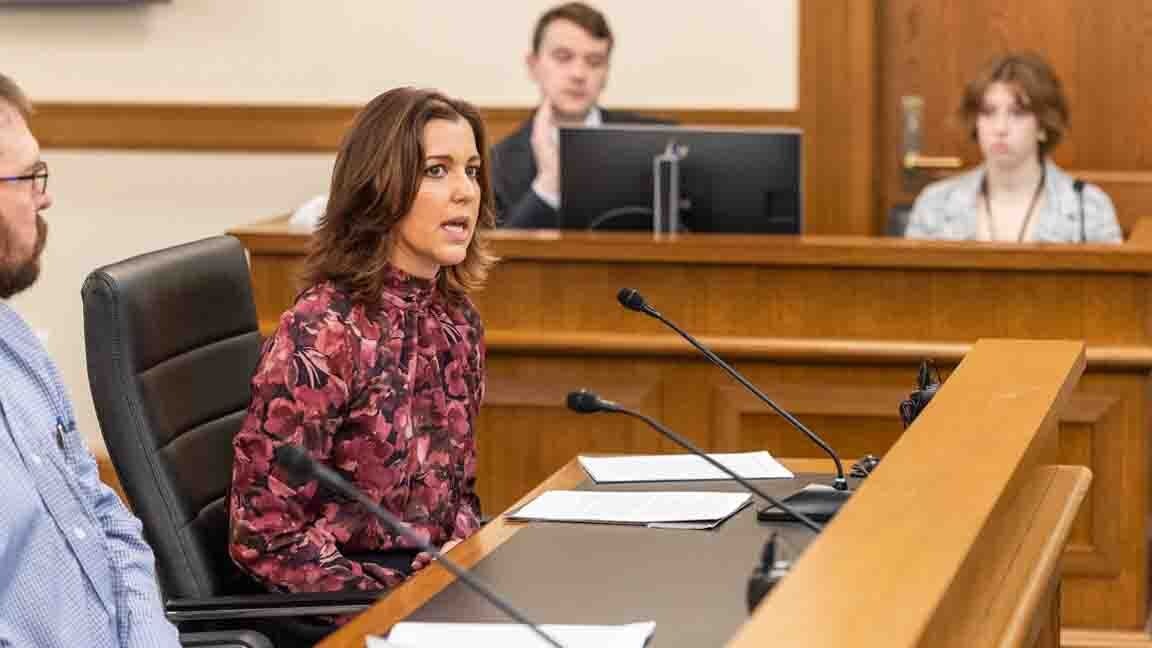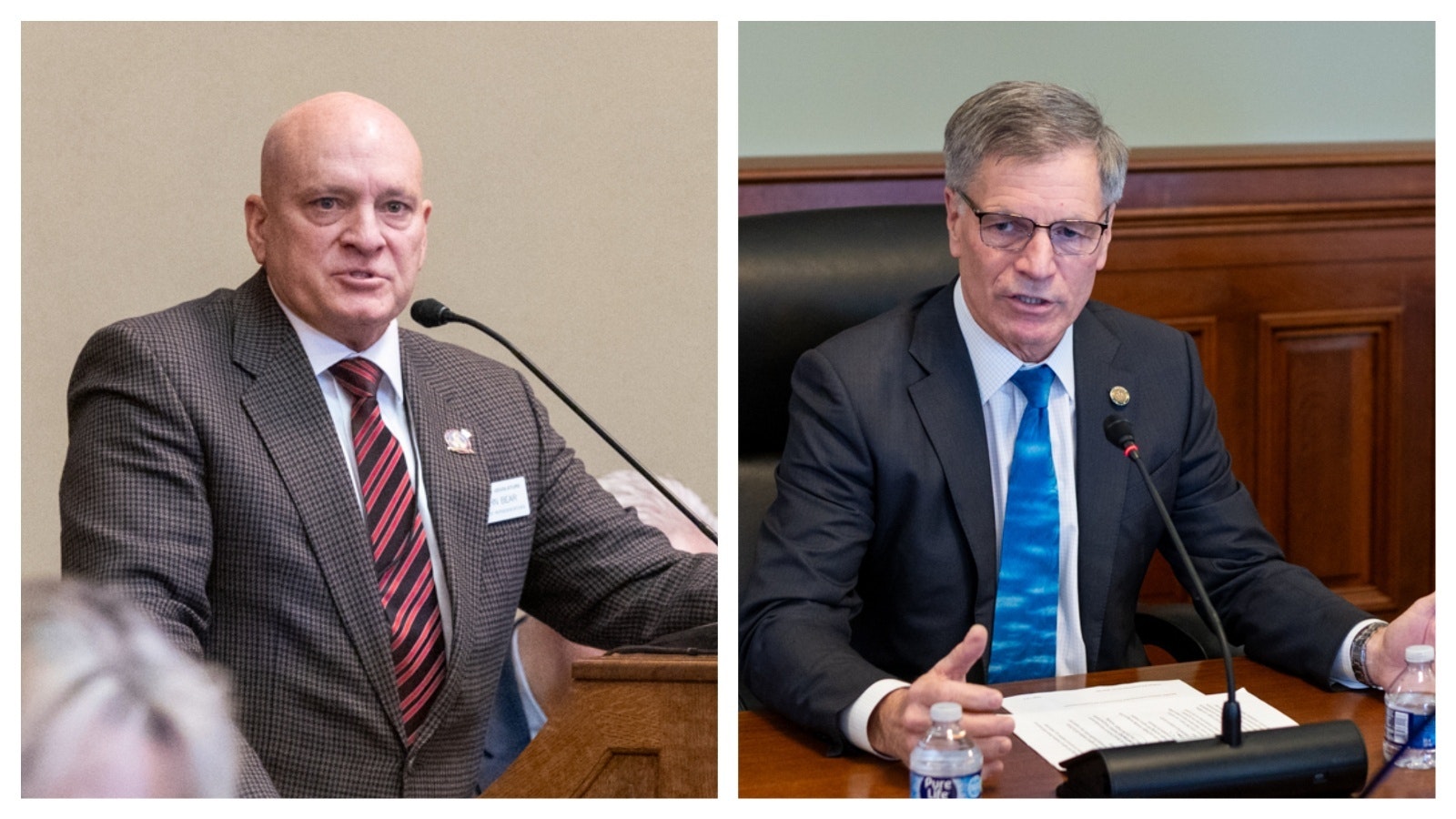A pair of bills advanced out of a House committee Wednesday that would put more restrictions on registering to vote in Wyoming.
The bills call for voters showing proof of Wyoming residency, 30 days of residency in Wyoming and of U.S. citizenship to vote.
The Wyoming residency and 30-day duration bill passed on an 8-1 vote with Rep. Mike Yin, D-Jackson, the only member of the House Corporations, Elections and Political Subdivisions Committee voting against it.
Every member of the committee except Yin is either a member of the Freedom Caucus or supports its ideology.
Secretary of State Chuck Gray said the bill sponsored by Rep. John Bear, R-Gillette, represents a cornerstone of his election integrity plan, which includes requiring proof of U.S. citizenship and residency.
Currently, an attestation of Wyoming residency is all that is required to register to vote, and there is no requirement on length of residency. U.S. citizenship is indirectly required to attain almost all of the acceptable forms of state identification.
Residency Requirements
Bear’s state residency legislation would require voters to prove their Wyoming residency at time of registration.
It would be up to Gray to develop rules identifying which forms of identification will be accepted to remove residency, but he clarified Wednesday that a P.O. box address listed on a driver’s license would be accepted.
The bill would also require people to have lived in Wyoming for at least 30 days to be able to vote. There now are no durational requirements in Wyoming. So far, 25 states have these requirements.
Gray said he would prefer a requirement longer than 30 days, which would be the longest in the nation, but believes 30 days is the best time to start with.
Prior to 1972, a voter had to maintain residency in Wyoming for one year and county of residence for a month to be eligible to vote, according to the state Constitution.
These requirements were struck down in 1972, when the U.S. Supreme Court ruled that lengthy requirements for voting in state and local elections are unconstitutional and determined a 30-day residency requirement to be ample to “complete whatever administrative tasks are necessary to prevent fraud.”
Although Gray criticized the fact that current laws only require an oath to prove residency currently, that’s all that would be required to prove duration of residency under the bill.
Bear’s bill also would prevent people who have lived in Wyoming for less than 30 days from voting in a presidential election. The Voting Rights Act ensures the right for Americans to be able to vote no matter where they live, but if they’ve moved somewhere new within 30 days of the election, must vote in their previous state of residence.
Mary Lankford, a representative of the County Clerks’ Association of Wyoming, said this could create confusion among people who have moved away from Wyoming to another state within 30 days of an election and how their ballots would be handled if they still attempted to vote in the Cowboy State.
Yin tried to address this issue with an amendment that would have changed the duration to those who intend to live in Wyoming for the majority of the year, but it failed to receive a second motion.
Voter Suppression?
Fremont County Clerk Julie Freese and others said the bill creates confusion about what documents could be used to prove residency and may end up reducing voter turnout.
Bear said concerns that his bill would make it more difficult to vote should be alleviated by Gray having rulemaking power to further address the issue. Many voting rights groups have accused Gray’s administration of trying to pass laws that suppress citizen voting.
Gray proposed his own rules last year that was basically the same as Bear’s bill, but Gov. Mark Gordon vetoed them. In his veto letter of Gray’s proposed rules, Gordon said the secretary didn’t have the authority to make the changes he sought.
The bill would make no changes for residents who wait until Election Day to vote.
Lankford expressed concerns that the bill will make it difficult for some Wyoming residents to prove their residency.
Marguerite Herman, a representative of the League of Women Voters, agreed, saying there could be unintended consequences of the bill that end up disenfranchising voters.
Herman and Marissa Carpio of the Equality State Policy Center said the bill could also hinder people to vote who are living a transient lifestyle, such as someone living in a shelter and or homeless.
Gray dismissed concerns about the bill preventing legal voters from voting, saying if anything, he expects more people to vote because they’ll have more confidence in elections.
He’s also frequently mentioned the single documented Wyoming case of an illegal immigrant successfully voting in Campbell County in 2020 as a reason to tighten Wyoming’s election laws.
There’s no evidence Bear’s bill would’ve done anything to prevent that person from voting if it was already in effect in 2020 and Herman urged the committee to avoid taking a “draconian” approach in response to the incident.
Gray said just because there hasn’t been many documented instances of illegal voting in Wyoming doesn’t mean it hasn’t been happening, citing occurrences in other states.
The bill also states that a county clerk shall not register a person to vote if they present identification or proof of residence that contains any indication that the person is not a citizen of the United States.
Roll Call
Voting in favor were Reps. Nina Webber, R-Cody; Ann Lucas, R-Cheyenne; Paul Hoeft, R-Powell; Tony Locke, R-Casper; Chris Knapp, R-Gillette; Gary Brown, R-Cheyenne; Steve Johnson, R-Cheyenne and Joe Webb, R-Lyman.
Proof Of Citizenship
The committee also passed another bill from Bear requiring proof of United States citizenship to register to vote in Wyoming.
Accepted forms of ID would include driver’s licenses, U.S. passports, birth certificates and military draft records.
The bill would remove ID cards issued by the University of Wyoming, a Wyoming Community College, or a Wyoming public school as acceptable forms of identification.
Some conservatives have criticized these IDs, saying they don’t properly identify international students. Others have gone further, saying out-of-state residents receiving education in Wyoming shouldn’t be considered residents.
This bill passed unanimously.
Leo Wolfson can be reached at leo@cowboystatedaily.com.





